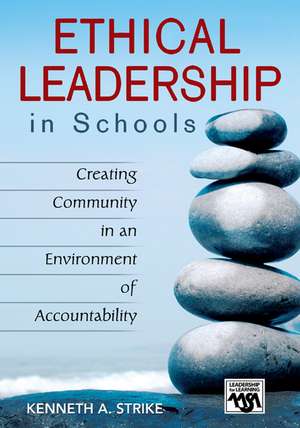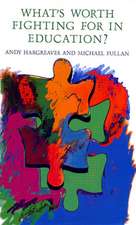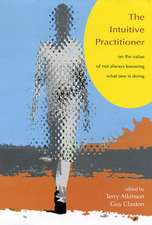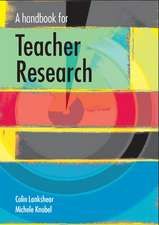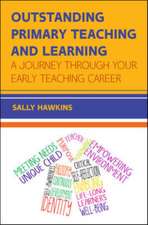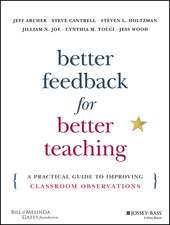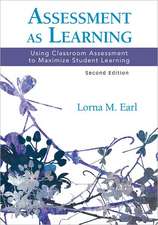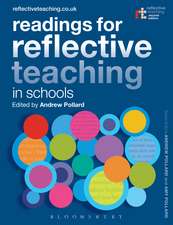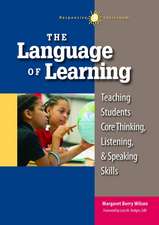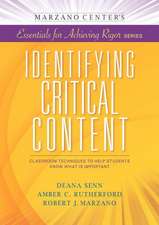Ethical Leadership in Schools: Creating Community in an Environment of Accountability: Leadership for Learning Series
Autor Kenneth A. Strikeen Limba Engleză Paperback – 16 oct 2006
To help resolve the dilemmas that challenge every school leader, this book will:
- Guide readers through the process of making ethical decisions
- Link ethics to issues of accountability
- Provide scenarios that reflect the difficult choices facing principals
- Supply the tools to create ethical advice in varied contexts
- Examine the central principles of fair cooperation
The study of ethics should emphasize what makes a school a good educational community. By creating communities that are competent and caring, school leaders will be able to maximize their resources and meet the growing demands of accountability.
| Toate formatele și edițiile | Preț | Express |
|---|---|---|
| Paperback (1) | 281.09 lei 6-8 săpt. | |
| SAGE Publications – 16 oct 2006 | 281.09 lei 6-8 săpt. | |
| Hardback (1) | 467.57 lei 6-8 săpt. | |
| SAGE Publications – noi 2006 | 467.57 lei 6-8 săpt. |
Preț: 281.09 lei
Nou
53.79€ • 56.31$ • 44.50£
Carte tipărită la comandă
Livrare economică 05-19 aprilie
Specificații
ISBN-10: 1412913519
Pagini: 176
Dimensiuni: 178 x 254 x 11 mm
Greutate: 0.37 kg
Ediția:1
Editura: SAGE Publications
Colecția Corwin
Seria Leadership for Learning Series
Locul publicării:Thousand Oaks, United States
Recenzii
"Provides clear explanations and scenarios that reflect real-life choices, explains the necessary tools to give ethical advice in varied contexts, and examines the principles of cooperation."
"Strike joins the issues, those clashes between the legislative bodies to whom we are ever more accountable, to the high professional standards of excellence inherent in our mission to create good schools. His book gives leaders the charge and the framework they need to bring balance back to our schools."
"I highly recommend this book to school administrators, professors, policy makers and philosophers. the author offers a clear and compelling vision of the aims of education and skilfully describes the process and criteria for ethical leadership."
Cuprins
Series Introduction
Preface
About the Author
1. Moral Principles and Moral Principals? An Introduction
2. What Is Education For?
3. Constitutional Essentials, Part I: Intellectual Liberty, Religious Freedom, and Intellectual Community
4. Constitutional Essentials, Part II: Equal Opportunity and Multicultural Community
5. Constitutional Essentials, Part III: Democracy, Community, and Accountability
6. Ethical Decision-Making
7. Professional Community and the Ethics of Accountability
References
Index
Notă biografică
Kenneth A. Strike is a professor of cultural foundations of education and of philosophy at Syracuse University. He is also professor emeritus at Cornell University, where he taught from 1971 to 2000, and is former chair of the Department of Education Policy Studies at the University of Maryland. He earned his BA from Wheaton College and his MA and PhD from Northwestern University. He has been a Distinguished Visiting Professor at the University of Alberta. He is a past president of the Philosophy of Education Society and was elected to the National Academy of Education in 1993. He was a member of the National Research Council Committee on School Finance, Equity, Adequacy, and Productivity from 1996 to 1999.
His principal interests are professional ethics and political philosophy as they apply to matters of educational practice and policy. He is the author of a number of books and well more than a hundred articles. Recent books include The Ethics of Teaching, The Ethics of School Administration, Liberal Justice, and the Marxist Critique of Schooling, and Ethics and College Student Life. Papers of note include ¿Professionalism, Democracy, and Discursive Communities: Normative Reflections on Restructuring¿ in the American Education Research Journal, ¿The Moral Role of Schooling in a Liberal Democratic Society¿ in the Review of Research in Education, ¿The Moral Responsibilities of Educators¿ in Handbook of Research on Teacher Education, ¿Can Schools Be Communities: The Tension Between Shared Values and Inclusion¿ in Educational Administration Quarterly, ¿Freedom of Conscience and Illiberal Socialization: The Congruence Argument¿ in the Journal of Philosophy of Education, ¿On the Construction of Public Speech: Pluralism and Public Reason¿ in Educational Theory, and ¿Centralized Goal Formation, Citizenship, and Educational Pluralism: Accountability in Liberal Democracies¿ in Educational Policy.
Professor Strike delivered the 1999 Kohlberg Memorial Lecture at the annual meeting of the Association for Moral Education. The address was published as ¿Liberalism, Communitarianism, and the Space Between: In Praise of Kindness¿ in the Journal of Moral Education, and he gave the keynote address at the Great Britain Philosophy of Education Society in 2000. This address was published as ¿Schools as Communities: Four Metaphors, Three Models, and a Dilemma or Twö in the Journal of Philosophy of Education. He has written on a variety of other topics, including school reform, desegregation, affirmative action, and religious liberty in education. His current work concerns the exploration of the normative aspects of school reform, emphasizing the notion of schools as communities. He is the recipient of a grant from the Spencer Foundation for this work.
Professor Strike lives in Thendara, New York, a small village in the Adirondack Mountains, in a house on the shore of the Moose River on which he regularly canoes, kayaks, and only occasionally bothers the fish.
